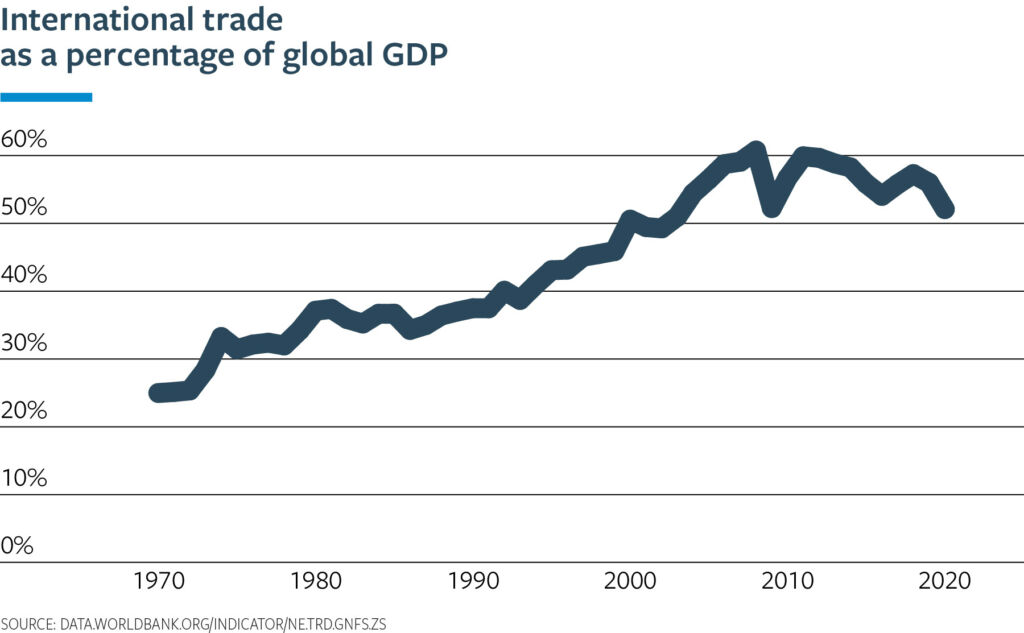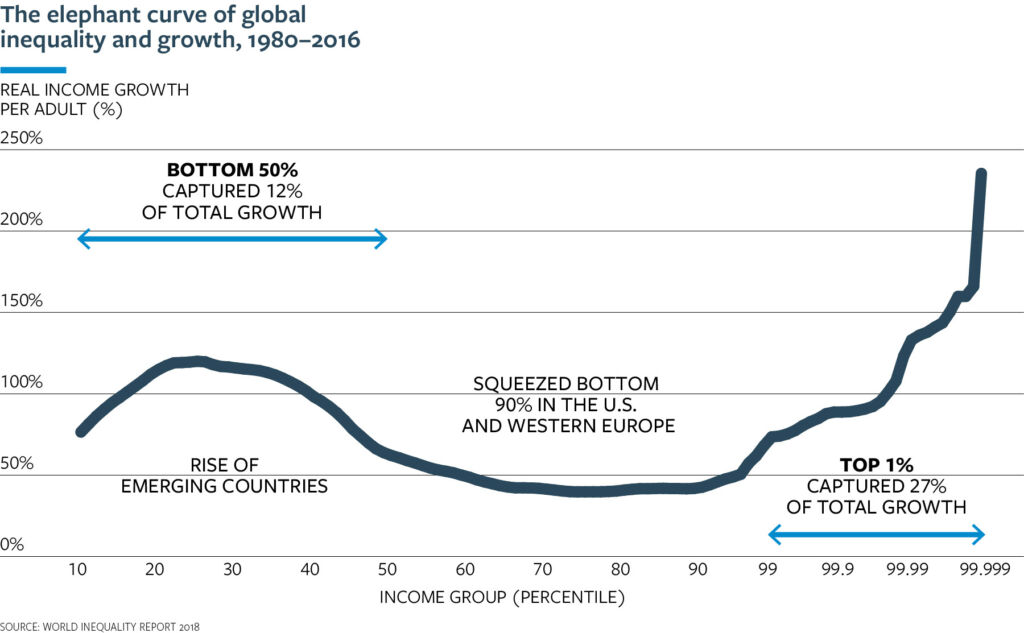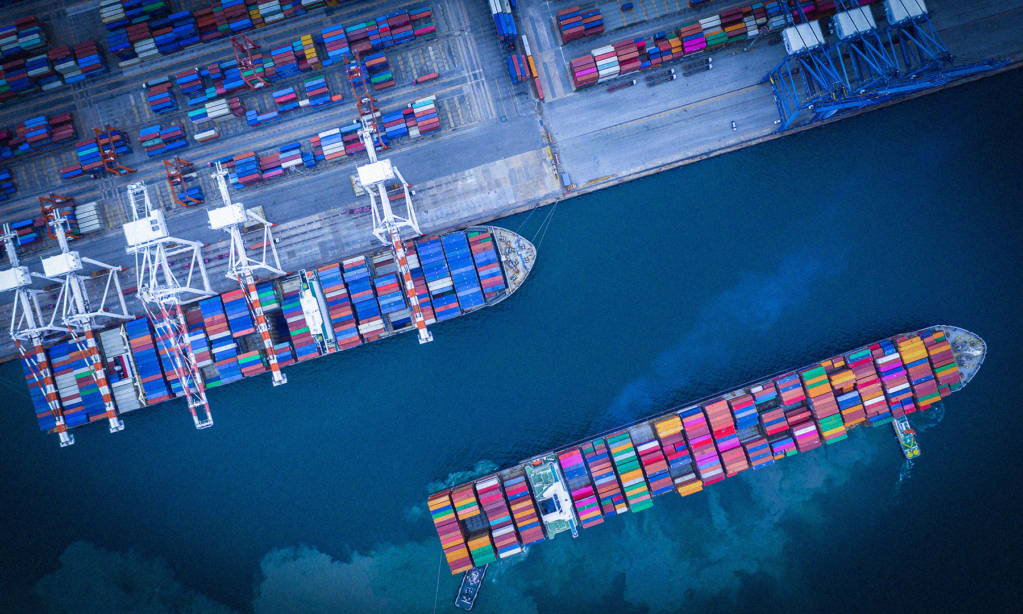For several years now, a consensus has been building that the era of neoliberal globalization may be coming to a close. There is less agreement on what will, or should, come next.
While progressives should welcome the decline of neoliberalism in the global economy—if that is, in fact, what’s happening—we shouldn't lose sight of the promises of globalization itself. Instead, we should learn from the successes of our political opponents in order to establish an egalitarian global political economy and a new era of progressive globalization.
Globalization refers to the growth of interconnectedness in the world’s political and economic systems. One simple metric for tracking globalization is the World Bank’s indicator of the share of global GDP accounted for by international trade, which nearly doubled between the mid-1980s and 2008.

This jump in trade has been attributed to technological changes, like the adoption of uniform shipping containers, dropping long-distance transportation costs, and advancements in communications. But radical changes to the rules of the global economy also played an important part.
Free trade agreements were adopted and global institutions were mobilized to pressure countries to cut regulations and government spending, privatize public industries, and lower protective tariffs on trade.
The new rules of the global economy fostered the outsourcing of labour-intensive production to low-wage countries, facilitated the extraction of vast amounts of wealth from developing to developed countries, and expanded the reach and security of private property rights. Above all, the new rules heavily favoured investors and large multinational corporations.
These changes were driven and informed by neoliberalism, a political ideology aimed at shrinking the state through privatization and austerity, reducing government intervention in the economy through deregulation, and unleashing the “free market.” Thus, we can see the shift from pre- to post-1990s globalization as the beginning of neoliberal globalization.
After a period of explosive growth, the global trade-to-GDP ratio has been slowly falling since 2008. In 2019, before the trade disruptions caused by the pandemic, the Economist wrote that “the steam has gone out of globalisation.” Stagnation or decline in cross-border investment, trade, bank loans, and supply chains all pointed to a new era of “slowbalisation,” noted the magazine.
Many observers agree that these trends herald the end of the era of neoliberal globalization. Economic historian Adam Tooze recently wrote that this era, with its “low rates, low inflation and growing global ties under liberal-democratic hegemony,” has been toppled by geopolitical shifts of power, the rise of populism, the global energy transition, and the aging of the global population. Similarly, BlackRock CEO Larry Fink told company shareholders in March 2022 that the Russia-Ukraine war put the final nail in the coffin of globalization.
Financial Times columnist Rana Foroohar argues that the world is entering a post-neoliberal era due to shifts in China’s economy, declining benefits from wage and energy arbitrage, and a push for higher environmental, social and governance standards.
Similarly, economist Dani Rodrik writes for Project Syndicate that “hyper-globalization” has been defeated by tensions between specialization and diversification as well as between national security and economic integration, distributional problems, and neoliberal assumptions about the irresistibility of economic forces.
While they disagree on the causes, both the champions and enemies of neoliberal globalization agree that the global economy of the future will not look like that of the last 30 years.
The world neoliberal globalization built
This may at first seem like good news. After all, there have been many problems with the era of neoliberal globalization. For one, while the unprecedented globalization of the last 30 years has led to an equally unprecedented tripling of growth in global GDP, the distribution of that new wealth has been grossly unequal.
Analyzing shifts in wealth from 1988 to 2008, Christoph Lakner and Branko Milanovic’s famous “elephant graph” showed that globalization had mostly benefited the “global middle” and the world’s richest (the global top 1% captured 44% of the increase in global income).
A 2013 World Bank report agreed that gains from globalization had mostly gone to “an emerging ‘global middle class’” in China, India, Indonesia, and Brazil and to the world’s top 1%, while the world’s poorest and lower- and middle-income earners in developed countries “lost out.”
An updated elephant graph from the 2018 World Inequality Report confirms this trend in more detail, showing that the global top 1% drastically increased its share of global income (from 16% in 1980 to 22% in 2000) while the global bottom 50% only slightly improved its share (from 8% to 10%). The report also notes that widespread privatization transferred vast sums of public capital into private hands.
An accompanying paper from the same authors, The Elephant Curve of Global Inequality and Growth, showed a similar trend for national income, with the top 10% growing and the bottom 50% shrinking their share of national income in almost all regions, but especially in the United States and Canada, India, and China.

And while neoliberal globalization’s damage to the environment is too extensive to properly summarize here, Tim Stobierski’s list, in his April 2021 Harvard Business School blog, gives an overview: climate change, pollution, deforestation, the spread of invasive species, habitat destruction, and loss of biodiversity.
All of these findings undermine the optimistic predictions of neoliberal evangelists for market rule. At the very least, neoliberal globalization has been very uneven in its reduction of international inequalities while drastically exacerbating domestic inequalities and supercharging climate change and ecological destabilization.
Given these problems, it may be tempting to celebrate the decline of globalization or, as commentators such as Foroohar have put it, the reassertion of politics over economics in global matters. But this would repeat a critical error made by neoliberals: assuming or pretending that economics can be apolitical.
Neoliberalism’s conceit was to paint the market as an apolitical, almost organic force that governments should avoid disrupting; that state action should be limited to the barest of regulations to correct rare market failures and keep market forces operating smoothly.
This belief allows neoliberalism to portray itself as a post- or non-ideological system for dispassionately managing the economy, to naturalize existing power relations, and to disguise its policy-making as a natural science rather than a pro-capital and anti-egalitarian political project.
The current arrangement of the global economy is neither natural nor inevitable; it is the result of a particular political project by particular people for ideological and self-enriching reasons.
In response, progressives point out the political decisions upon which market economies and capitalism depend. It was through political decisions that private property, patent law, incorporation rights, export credit agencies, court systems, police forces, taxation, regulation, and other prerequisites of market economies were established. And it is only by upholding these rules and institutions that markets can function at all.
That is, the “free market” is an oxymoron: capitalism does not exist in a state of nature and the economy is always political.
So, despite what neoliberals would have us believe, the current arrangement of the global economy is neither natural nor inevitable; it is the result of a particular political project by particular people for ideological and self-enriching reasons. And its current problems are no more immutable in a globalized economy than private property, market exchange, and commodity production are in a domestic economy.
All economies are shaped by power, as enacted through institutions of economic governance, and control over these institutions is a primary object of political struggle. In a domestic economy, a powerful working class may use these institutions to win higher pay, shorter hours, better working conditions, and union rights. Or a powerful owning class may use them to enforce low pay, long hours, and unregulated work, and to suppress unionization.
The same dynamic exists in the global economy and allows us to see the era of neoliberal globalization as an era of neoliberal control over the institutions of global economic governance.
The World Trade Organization (WTO) was established in 1995 to facilitate and govern international economic relations based on neoliberal principles establishing extensive global rights and protections for corporations and investors. There is currently no floor in any of the WTO agreements for labour rights or environmental protections, allowing (if not encouraging) countries to compete for investment based on low wages and lax regulations. Nor do these agreements support more active, pro-worker economic policies.
Other institutions were used even more aggressively to enforce neoliberalism’s political project in the global economy, such as the global web of investment treaties adjudicated by the World Bank’s International Centre for the Settlement of Investment Disputes (ICSID) and the bank’s structural adjustment loan programs (see David Schneiderman’s article in this issue of the Monitor).
Investor-state dispute settlement (ISDS) cases against environmental policies are becoming so common—what Joseph Stiglitz has called “litigation terrorism”—that the IPCC’s 2022 report warned that they pose a serious risk to global climate action (see Kyla Tienhaara and Rachel Thrasher’s article in this issue of the Monitor).
In stark contrast to these highly enforceable rights for investors, James Harrison explains in the Journal of Common Market Studies that “there have been no complaints taken to the expert panel in any EU [free trade agreement]” regarding the deals’ trade and sustainable development provisions.
And while Canada’s “inclusive trade agenda” aims to help women-owned, Indigenous-owned, and other small businesses do more international trade, it includes little in the way of enforceable guarantees for workers and does nothing to address the climate emergency.
If the neoliberal narrative about the natural and apolitical course of economies is accepted, then all these outcomes would seem to condemn globalization. But as Harrison explains, “the deficiencies of labour provisions, coupled with the strength of provisions that promote the interests of capital…mean that it is perhaps more illuminating to see the trade and labour story so far as more about class struggle.”
That is, the era of neoliberal globalization resulted from neoliberal victory in the struggle to control the institutions of global economic governance. Under a different balance of political power, globalization could have taken—and can still take—a different path.
Glimpses of an alternative
The growing criticism of neoliberal globalization has pressured international trade negotiators to produce agreements that can be deemed progressive. This often ends up as meaningless progressive branding tacked onto status quo agreements, but it is starting to lead to incremental positive reforms.
For example, the 2016 Morocco-Nigeria bilateral investment treaty requires investors to conduct social impact assessments of their activities; the Indonesia-EFTA free trade agreement conditions lower tariffs for palm oil imports on meeting certain sustainability criteria; and the EU-Mercosur agreement, if it is ever signed, will require Argentine and Brazilian chicken egg traders to prove their products meet EU-style animal welfare criteria.
The original Trans-Pacific Partnership (TPP, now the CPTPP) also included a unique attempt to raise labour standards in Vietnam, Malaysia, and Brunei through “labour consistency plans” negotiated by the United States.
Instead of merely including a list of best practices in the TPP text and trusting all parties to live up to the spirit of the deal, these country-specific labour plans required explicit changes to domestic labour laws to bring them into compliance with the core International Labour Organization (ILO) conventions listed in the TPP’s labour chapter.
These changes included legislating freedom of association, collective bargaining rights, protection against employment discrimination, improvements to rights for migrant workers, prohibitions of forced labour, prohibitions of child labour, and requirements for minimum wages. The plans also contained transparency, reporting, inspection, and third-party review mechanisms to ensure labour reforms were implemented before the U.S. would ratify the agreement, as well as the opportunity for the U.S. to suspend tariff reductions if the conditions were not met.
When the U.S. pulled out of the TPP negotiations under the presidency of Donald Trump, there was no one left at the negotiating table with the market clout to enforce the labour consistency plans, which were pulled from the final CPTPP package. Workers in Vietnam, Malaysia, and Brunei are worse off under the ostensibly “progressive” CPTPP championed by Canada than they would have been under the original deal, and they likely would have been better off under the TPP than under no deal at all.
More success was found when NAFTA was renegotiated and replaced with CUSMA (or USMCA in the United States). The new agreement removed the investor-state dispute settlement process between Canada and the U.S. and limited its use between Mexico and the U.S.
Also importantly, CUSMA introduced a novel Rapid Response Labour Mechanism (RRM) through which labour rights violations at individual Mexican workplaces can be contested and corrected or sanctioned at the company level (see the article by Laura Macdonald and Angelo DiCaro in this issue). In just two years, this mechanism has resulted in more enforcement cases for labour rights violations than all previous trade agreements put together.
Most recently, the European Commission’s 2022 report to the European parliament on trade and sustainable development (TSD) provisions in EU trade deals lays out plans to extend dispute settlement mechanisms to cover labour and environmental commitments. This change is the direct result of pressure from labour and environmental voices on the EU’s domestic advisory groups, which are to be tasked with helping the EU enforce TSD chapters in future agreements.
A new era of progressive globalization
While some are small and others are not yet solidified, these victories should inspire progressives to fight for even more. Future free trade agreements could advance workers’ rights around the world, with rapid response mechanism-type provisions, or advance environmental and social causes with TPP-style up front demands for specific reforms.
Raising the enforceability of environmental and social provisions to the standards investors have enjoyed for decades could turn trade agreements from one of climate action’s greatest impediments into one of its greatest guarantors.
Progressives could also reorient existing institutions toward new ends. Instead of conditioning loans on pro-investor laissez-faire reforms, the International Monetary Fund could tie funds to preventing deforestation or habitat loss.
Or preferential loans could fund green energy transitions, public transportation infrastructure, and expanded public health systems.
The World Bank could be retrofitted to support sustainable development instead of purely extractive industries, or to advance the sort of reforms known to encourage sustainable and inclusive growth, like low unemployment, high wages, high levels of education, gender equality, progressive taxation, and public ownership of basic utilities.
At the WTO, instead of the self-interested reforms proposed by the developed countries of the “Ottawa Group,” the organization could be reformed along the lines described by Rorden Wilkinson in his book, What’s Wrong With the WTO and How to Fix It.
This highest institution in the global political economy could be remade from a technocratic facilitator of “market openings” into “a global version of a national department of trade and industry” focused on trade-led development for all.
The ability for corporations to exploit regulatory arbitrage could be ended by introducing global regulations to match global supply chains, including global minimum corporate tax rates, carbon pricing, and environmental protections.
Progressives must adopt a thoroughly globalized perspective on democracy, justice, and equality.
Workers of the world could truly be united by making the ILO Conventions as enforceable as the TRIPS Agreement and empowering the organization to be an effective champion of worker’s rights globally, even eventually working toward global sectoral bargaining.
Women, queer people, disabled people, migrants, and other marginalized groups could be uplifted by making participation in the global economy conditional on respect for basic human rights instead of basic investor rights. Not only could countless present and future lives benefit from an equitable distribution of the prosperity that comes with a globalized economy, but a new era of progressive globalization could bring about the greatest advances in human equality the world has ever seen.
To achieve this, progressives must adopt a thoroughly globalized perspective on democracy, justice, and equality.
We must reject the anti-democratic idea that a globalized progressive politics represents developed countries telling developing countries what to do.
We must reject the nationalist idea that using global institutions to fight for justice everywhere represents an unjust encroachment on national sovereignty.
And we must reject the inegalitarian idea that we only have a stake in what happens within the borders of our own nation-state.
Solving global problems like climate change, global inequality, and global poverty requires powerful global political institutions, which can only exist in an extensively globalized political economy.
That is why progressives around the world must fight to save globalization through progressive global economic governance. Only with the establishment of a new era of progressive globalization can the world achieve an egalitarian global political economy.







